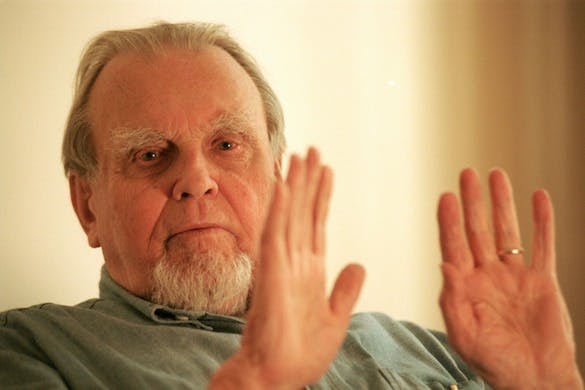Capturing the Duality of Czesław Milosz
Eva Hoffman is parsimonious about the personal, private details of the poet’s life, and yet Milosz the person nonetheless emerges — without the zealous ministrations that sometimes diminish the power of biographies.

‘On Czesław Milosz’
By Eva Hoffman
Princeton University Press, 224 pages
No better biographer of the Polish Nobel Prize-winning poet seems possible than Eva Hoffman, considering her parallel experience of exile from Poland and settlement in America. The renowned author of “Lost in Translation” is part of the Visions from the Other Europe (Writers on Writers) series.
Much of Milosz’s life was burdened by a fraught history: the brutal invasion of Poland from the west by the Germans and from the east by the Russians. The leveling of the Warsaw ghetto was on his watch, so to speak, and he struggled to come to terms with what part he ought to have played in the uprising.
Ms. Hoffman is troubled by her compatriot’s ambivalence. Milosz wondered if such desperate resistance, doomed to failure, was worth the extinction of so many lives. The poet participated in helping Jews escape Nazi retribution, but he frankly acknowledged that he wanted to save himself for his poetry.
Whatever Hoffman holds against Milosz, as she thinks of her own Jewish family members who perished in the Holocaust, she portrays a writer unsparing in his self-criticism and honesty. He was no antisemite. He learned Hebrew in order to translate parts of the Bible.
In post-war Poland, Milosz joined the Communist regime as a diplomat, even though he did not believe in its ideology and only wished, again, to be free to write his verse. He first came to Western attention with the publication of “The Captive Mind,” a profound study of why certain Polish intellectuals collaborated with the Soviet-dominated regime, and why, finally, he had to leave Poland and his diplomatic post so that he could write more freely.
Yet what Milosz discovered, in his first exile in Paris, were Soviet apologists like Sartre who shunned this poet from the “other Europe.” As Milosz later pointed out, no French institution of higher learning offered him a job. Not until 1970 was he able to become a professor of Slavic languages at the University of California, Berkeley.
The ironies of Milosz’s life continued, Ms. Hoffman points out, with the New Leftists rejecting his anti-Communist vision. Yet he did not reject his new American home. On the contrary, his poetry shows a powerful identification with California history and especially with the land and its tremendous expansiveness and variety. He was dazzled by a country that had so many different varieties of pines. He had grown up supposing there was just one kind.
The pines taught the poet to be open to an environment that, however alien, had much to teach and delight him. Although he did not write in English, remaining always faithful to his mother tongue, he translated himself and collaborated with American translators of his work, which, in a way, was how he reckoned with the doubleness of his experience.
Then, as Ms. Hoffman relates in her moving prose, the history that had been a burden came to his rescue. Welcomed back to Poland after the Soviet Union disintegrated, he became a dual citizen, marrying for a second time an American scholar after the death of his Polish wife.
Of course, history remained deeply seared into his memory, but as he aged the poet became more confessional. In his last years, Milosz was a public man, and as such, Ms. Hoffman implies, he subjected himself to a degree of exposure that would have been unthinkable when he thought the memory of history required him to be circumspect about himself, to forsake a probing of his own personal dilemmas.
This short biography is saturated with quotations from Milosz’s poetry that Ms. Hoffman uses to gauge his developing sensibility. She is parsimonious about the personal, private details of the poet’s life, and yet Milosz the person nonetheless emerges — without the zealous ministrations that sometimes diminish the power of biographies.
Ms. Hoffman obviously thinks of Milosz as a great writer, but how great she evidently does not want to say. After reading her nuanced interpretations of his poetry, though, it is hard to imagine how any other poet in the 20th century can match him for the range and perfection of both his life and work.
Mr. Rollyson, as a Fulbright fellow, taught at Gdansk, Poland, in 1979-80.

